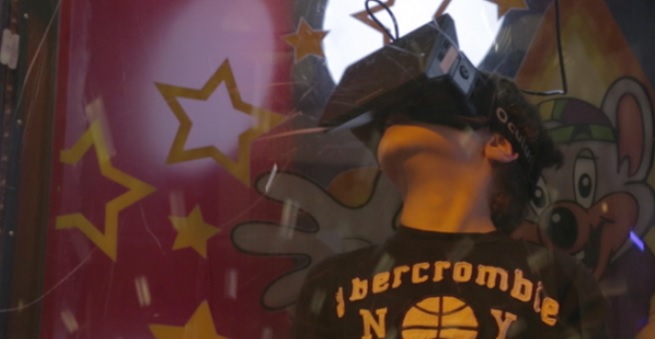Your local Chuck E. Cheese‘s may be going virtual.
The pizza-arcade chain is trying out the Oculus Rift virtual-reality headsets at 29 locations. If successful, the tests could show the potential for virtual reality to reestablish itself in the location-based entertainment business and move beyond its pure gaming applications — and sheds more light on the potential Facebook saw when it acquired the company for $2 billion earlier this year.
Oculus VR hasn’t officially released the VR headsets yet. But Chuck E. Cheese’s announced that it will test the Rift in its Virtual Ticket Blaster Experience at 29 Dallas, San Diego, and Orlando locations over six weeks. In the demo, a player stands in an enclosed booth where, typically, wind blows up a bunch of redemption tickets for the player to grab in a given amount of time. The Rift will be in the same booth with 360-degree head-tracking. Players have to line up crosshairs with virtual tickets to see how many tickets they can virtually grab inside the booth.
“Kids today have unprecedented access to game consoles and tablets,” said CEC Entertainment president Roger Cardinale. “Our challenge is to deliver an experience not available at home, and there is no doubt virtual reality does just that. Oculus Rift technology is the next frontier in the gaming industry, and we’re thrilled to be able to say it’s part of the Chuck E. Cheese’s lineup.”
In the meantime, Wired magazine published a cover story on Oculus VR and its founder, Palmer Luckey, in its June issue. It recounted the story of how, in 2011, an 18-year-old Luckey hacked together a rough prototype for a VR headset in his parents’ garage in Long Beach, Calif. In June 2012, legendary game designer John Carmack publicized one of Luckey’s prototypes with a Doom 3 demo, and that started an accelerated ride toward a record Kickstarter crowdfunding, a $75 million VC funding deal with Netscape founder Marc Andreessen, and the $2 billion acquisition by Facebook — all within a three-year period.
Oculus still doesn’t have a ship date for its real headset. But Luckey managed to inspire everyone, including rival Sony, to believe in VR again. Developers are creating Rift-enabled tools to do their own demos, and that’s how Chuck E. Cheese’s is fielding its own VR experience.
Wired notes that Framestore, a visual effects firm, created a virtual Game of Thrones experience for HBO; Gravity director Alfonso Cuarón has visited Oculus headquarters; and the company recently hired its own director of film and media.
Wired reports that when Luckey first heard about Facebook’s interest after CEO Mark Zuckerberg tried a prototype in February, he was skeptical.
“It’s not the first thing you think,” Luckey told Wired. “‘Wow! Facebook! That’s exactly who I would have imagined to be a good partner!’ So they did run the ring of fire a little bit convincing us.”
Zuckerberg persisted and convinced the team he was serious about VR’s potential far beyond Facebook’s existing services and beyond gaming.
“This isn’t about sharing pictures,” Luckey said. “This is about being able to share experiences.”
The deal was negotiated in eight days in mid-March. After it was done, veterans like Valve’s Michael Abrash and Aaron Nicholls joined Oculus.
Despite skeptics, Luckey said that VR needed a big sponsor.
“Every VR product has been a failure,” Luckey said. “Nobody lending money for manufacturing looks at Oculus and says ‘I can loan you $250 million!’ Because they know the safe bet is we’re going to fail, go bankrupt, and take hundreds of millions of dollars with us.”
VentureBeat's mission is to be a digital town square for technical decision-makers to gain knowledge about transformative enterprise technology and transact. Learn More


